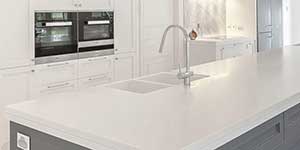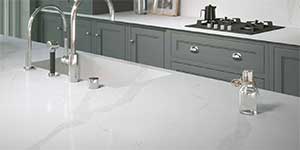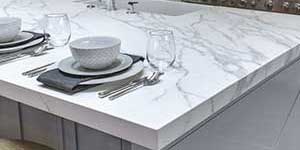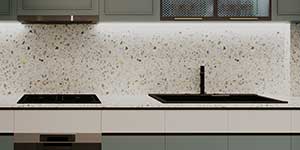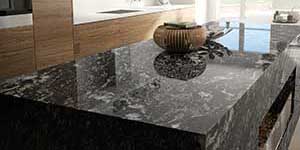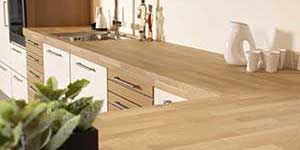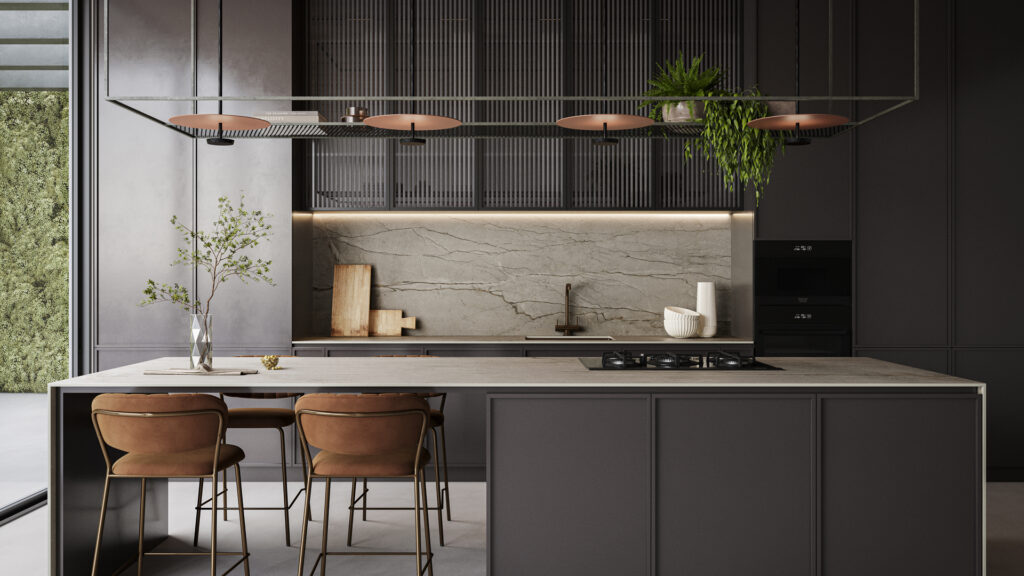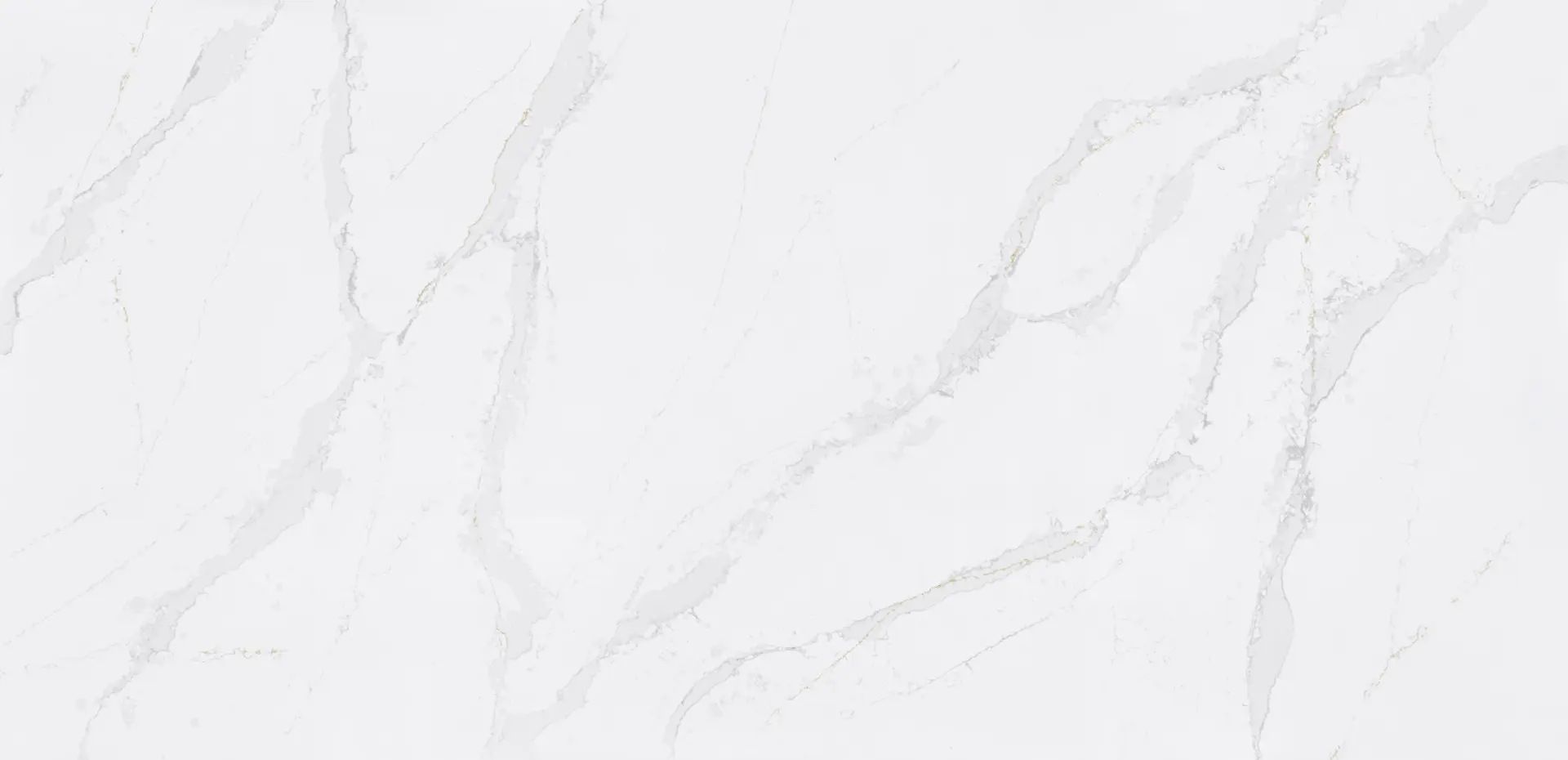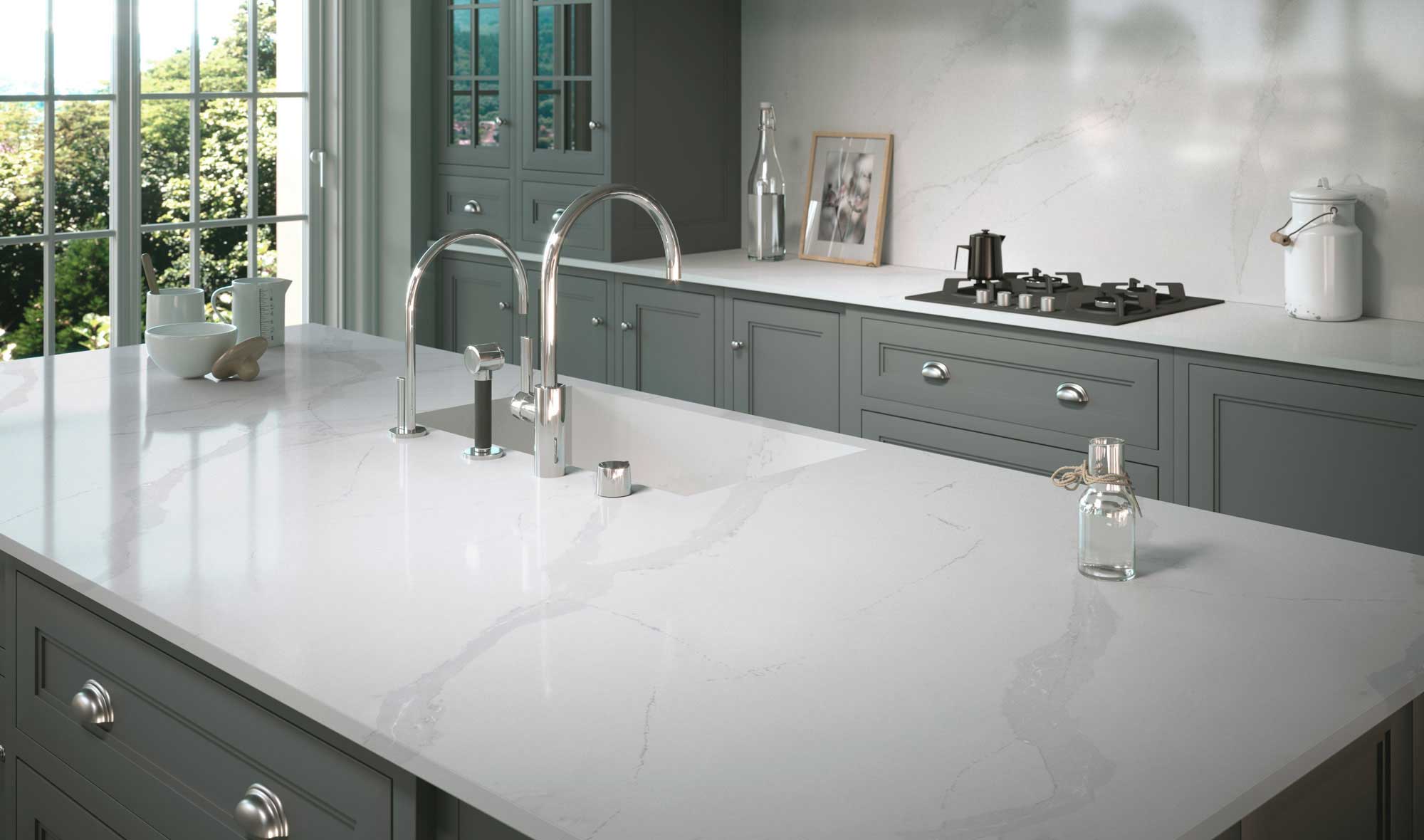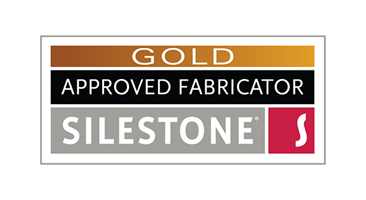Corian worktops are made from reconstituted pulverised natural minerals, strengthened by polymer acrylic resins in a ratio of about 1/3 resin to 2/3 mineral compound. This translates to a solid surface with all colours and patterns going throughout the entire thickness of the worktop. This means Corian is a solid, hard, non-porous homogenous slab, suitable for elegant worktops in kitchens or bathrooms, vanity tops, countertops, benches, or shower walls. Corian can be engraved, or polished or textured to personalise it and through a special process can be shaped into basins, sinks, shower trays, etc. It can even be formed, sculpted and shaped into almost any other shape – limited only by your imagination.The good news is also that any scratches or damage can be sanded or polished out, without changing the beauty or appearance of the surface. Cavities can be filled. The quality of Corian worktops is backed by two levels of protection, a 10 year warranty against product defects and also a 10 year limited “installed” warranty.
In which thickness is Corian available?
For various applications and cost considerations, Corian is manufactured in sheets of 6 mm, 12.3 mm and 19 mm.
6 mm sheets are usually limited to vertical applications (for instance wall cladding.) The choice between 12.3 mm and 19 mm sheets is usually determined by personal choice, aesthetic appearance, cost, strength required over longer surfaces, and durability in high traffic or robust areas.
Various techniques are employed to support and strengthen worktops, countertops or vertical applications stretching over long spans, and undermounting sinks and basins, without detracting from the classiness of Corian.
Is Corian only available as sheets?
Because Corian can be formed and shaped, it is moulded into integrated single or double basins, sinks, accessories, end details, upstands, downturns, splashbacks, fixtures, fittings, decorations, etc. almost perfectly matching the colour and patterns of your worktops. Sheets can also be moulded, shaped or sculpted into various artistic shapes in the factory.
How many different colours are available for Corian worktops?
The Corian colour range is constantly adapted to give better choices and versatility and the current 80 colours, in combination with other materials, allow for an almost unlimited working palette.
The designer can choose from single colours or a neutral basis, to eye catching bright colours and harmonies or contrasts, to the classic look of natural stone.
Sub palettes are divided into Extra lights, Beiges, Naturals, Warms, Yellow greens, Greens, Blues, Brights, Greys and Extra darks. For easy reference, Worktops.net have also divided the colours into price bands.
Because Corian is essentially made from natural minerals, slight variations of colour and pattern will be discerned from one sheet to the next. Rather than detract from the beauty of the worktops, this adds that additional natural aesthetic appeal.
How are Corian worktops joined to create harmony and a seamless appearance?
To minimise wastage and for maximum strength, corner joints and butt end joints are usually square rather than mitred. They are smoothed and joined with specially formulated colour coordinated adhesives, caulking and a heat process that make joints almost imperceptible, giving the appearance of a solid, seamless design.
Cut-outs and corners are rounded and polished smooth and edges and to finish the worktops off, end details, up-stands and downturns are available in a wide variety of shapes and designs.
Provision is made for clearances to allow for thermal expansion and contraction. This avoids cracks showing later.
Repairable
Heavy stains and scratches can be erased without a trace simply by rubbing with household cleaner
Durable
Proven to be remarkably durable, a versatile material that is easy to live with in both domestic and commercial environments
Nonporous
Bacteria and mould have nowhere to take root. When it looks clean, it really is clean
Seamless
Inconspicuous seams result in a smooth surface that enables you to create large designs fashioned from a single element

Easy to Clean
With a non-porous surface that prevents dirt and stains from penetrating the material.
When should I not use Corian?
In the first instance, one should not use Corian when common sense tells you it is not safe. For instance, if it might be too heavy to be properly supported, if moisture could be trapped behind it and damage the structure behind, above or below it, or when it will be exposed to strong corrosive chemicals or acids.
Typical examples would be when the wall or masonry construction is not strong enough to support its weight. Corian is not recommended for photographic laboratories, as corrosive chemicals and developing liquid stains will require sanding to remove, which in turn creates dust in the laboratory.
Corian can withstand high temperatures, but in extreme conditions, heat shields or hot pads should be used to protect it.
Corian is non-porous and resistant to stains, so chemicals will not be absorbed, but corrosive chemicals or acids will damage the surface. Of course, the duration of contact will determine the extent of damage.
6 mm sheets are not recommended for horizontal application, worktops, countertops, etc.
When harder worker surfaces are required, it might be advisable to consider quartz worktops.
The really “geek stuff.” Technical data
- A sample of the chemical resistance of Corian. These chemicals show no reaction for test periods of up to 16 hours:
- Acetic acid (10%); Acetone; Aromatic Ammonia; Ball point pen ink
- Household bleach; Benzene; Blood; Dry bond dental adhesive
- Ethyl acetate; food colouring, gasoline, ketchup (tomato sauce); tea
- Tincture of iodine; uric acid, vinegar, hydrogen peroxide
- Performance properties of Corian
- Density: 1.78X103 Kg/m3
- Tensile strength: 34.9-39.5 N/mm2
- Weight per m2
- 6mm: 11.5 kg
- 3 mm: 23 kg
- 19 mm: 34 kg
Other inspiring articles
Exclusive 40% OFF on 6 colours of the new Caesarstone Porcelain Collection
Caesarstone, a world-renowned leader in premium surface materials, has expanded its impressive portfolio by introducing a new line of porcelain worktops. Famous for their high-quality quartz surfaces, Caesarstone’s venture into porcelain showcases their dedication [...]
Why Silestone Eternal Calacatta Gold is one of the UK’s best selling worktop colours
In the world of interior design, the kitchen is more than just a functional space; it's the heart of the home, a place where style meets practicality. One of the standout stars in kitchen [...]
A Solid Choice: Why Solid Surface Worktops are a Top Pick for your Kitchen
Solid surface worktops, such as Corian, Hanex, and Hi-macs, have been steadily gaining popularity in the world of kitchen design and renovation. While there's a plethora of worktop materials to choose from, solid surface [...]
Choosing the Perfect Kitchen Worktop
A comprehensive guide to Quartz, Solid Surface, Ultra Compact, Granite, and Wood When it comes to designing your dream kitchen, one of the most crucial decisions you'll make is selecting the perfect [...]

